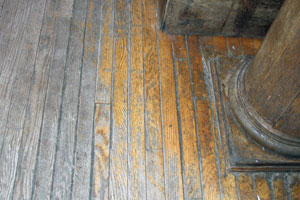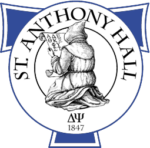The Capital Campaign Explained
History
St. Anthony Hall was founded as the Fraternity of Delta Psi on January 17, 1847, at Columbia University in New York. It began as a true fraternity dedicated to the love of education and the well being of its members. Chapters were soon founded throughout the Northeast, and extended into the South during the mid-1800s.
 On April 20, 1860, the Upsilon chapter of the Fraternity of Delta Psi was founded by a small group of undergraduate students at the University of Virginia. Most people do not know the chapter barely made it beyond its first year, as it closed in 1861 at the outset of the Civil War and did not reopen until 1866. Many members wore their badges into battle, serving with distinction and were often reunited with brothers in the Northern chapters in both pleasant and antagonistic situations throughout the war.
On April 20, 1860, the Upsilon chapter of the Fraternity of Delta Psi was founded by a small group of undergraduate students at the University of Virginia. Most people do not know the chapter barely made it beyond its first year, as it closed in 1861 at the outset of the Civil War and did not reopen until 1866. Many members wore their badges into battle, serving with distinction and were often reunited with brothers in the Northern chapters in both pleasant and antagonistic situations throughout the war.
Similarly, members of the fraternity took part in both the First and Second World Wars. Many honorable lives were lost, and the fraternity faced crises during each of these conflicts. St. Anthony Hall continued to prosper, however, in their aftermath. The Hall was always open and waiting for brethren to return from the front.
In April, 2010, the chapter celebrated its 150th Anniversary. Today we are part of an institution with a proud heritage linked closely to the University, which has thrived over the decades as a place of social, academic, and athletic leadership. More importantly, the Hall defined our U.Va. experience by forging friendships at a dynamic and challenging point in our lives.
Greek System at U.Va.
The operating environment facing all fraternities at the University has become quite perilous. While the University remains committed to the Greek system, certain houses have encountered precipitous difficulties. Over the past several years, the University has seen the SPE, DTD and Phi Kapp Chapters all close their doors in response to challenges encountered with the national headquarters or University community. Today’s students live in a world where heightened scrutiny and increased transparency make fraternity life difficult. As an example, several fraternity presidents have been personally arrested for building code violations that require thousands of dollars to address.
In the face of this adversity, the Alumni Association at the University has offered to aid certain fraternities in building capital campaigns. This coincides with the University’s broader $3.0 billion capital campaign goal. The DKE house was the first to launch a capital campaign that successfully raised $1.5MM. St. Elmo Hall is finalized a campaign that raised $1.6MM in pledges. The proceeds from these campaigns were used to address the current living conditions in the houses and create endowments for the ongoing livelihood of the chapter.
Current Chapter Highlights
The Hall is a healthy and vibrant place in terms of membership. Currently, the average undergraduate brothers number 53, hailing from about 15 states. The house is full each year with most of the second year class living there. Most impressive is the Hall’s commitment to extracurricular life at the University, covering everything from varsity sports, student government, and volunteerism.
In the last couple of years, the Hall has produced an honor committee chairman, an IFC president, and a president of the Architecture School. Below that level is a large number of IFC vice chairmen and committee chairs, honor committee advisors and counsels, and judiciary committee members and investigators. Three brothers have been Lawn residents during the last two years. Several are actively involved in Madison House volunteer and outreach activities.
In athletics, the Hall has contributed several varsity players in football, basketball, and wrestling. One recent graduate plays for the Buffalo Bills. On the competitive club sports level, the Hall boasts athletes in golf, tennis, squash, basketball, soccer, and water polo. Finally, on the IM level, the Hall finishes near the top each year, and won the High Point Championship 3 years ago.
Over the past four years, the Hall has had two Jefferson Scholars. Each year, several brothers in the Commerce School are offered positions with top firms in New York. Others pursue education in medical and law schools. One brother recently received the University’s most prestigious undergraduate research grant and brothers have received the T. Rodney Crowley Scholarship two years in a row.
Financial Realities
The house is as always the epicenter of the brotherhood. However, the house at 133 Chancellor St is now more than 100 years old, and as beautiful as it is, it takes a daily beating as a fraternity house. No major renovation has occurred since the ambitious house upgrade project of the mid 1980’s. The prospect of addressing the pressing needs of the building from operating income alone is essentially zero.

The undergraduate chapter continues to live within its means and underwrites through club dues and parlor fees all of its operating expenses. The house out sources a number of its operating processes to the Historic Renovation Corporation which provides all the financial accounting and building maintenance in a very professional manner. Based upon current year results, the operating budget for the Hall is $91,800 for FY 2007/08. The revenue is generated from room rent ($58,300) and parlor fees, ($32,000). The major expenses in this budget include utilities ($24,000), building maintenance ($22,000), debt service ($20,500), insurance and taxes ($14,200). The active chapter does not currently have any endowment or capital resources beyond equity in the building.
Currently, there are several pressing needs that include the replacement of the main level floors (sanded and refinished many times), refinishing of all other floors, complete exterior painting, including major surface preparation and replacement, major repairs/replacement to the bathrooms due to numerous leaks, code upgrades to the kitchen, and several other projects. The total of all these projects entails a budget of $150,000. The Hall would also benefit from a retirement of the existing mortgage debt of approximately $30,000 in order to eliminate the burden of principal and interest capital expenses from the operating budget.
The St. Anthony Alumni Association of Virginia (SAAAV) continues to provide leadership and governance to the Chapter. The organization is currently chaired by Ernie Dettbarn ’95. The SAAAV’s annual expenses are roughly $12,000 to cover the “holding company” expenses of financial and tax record keeping, national chapter expenses, development budget and administrative costs. The SAAAV does not have an endowment nor any current cash reserves to perpetuate its important role in overseeing the future of the fraternity, beyond it current $5,000 cash balance.
Capital Campaign
As part of the much anticipated 150th Anniversary celebration, St. Anthony Hall will undertake a $1.5 million capital campaign. It is estimated that $500,000 will safely cover all house improvements, retire the debt, and pay for the cost of the campaign (see Table). The remaining $1 million will be held in trust and managed by the Alumni Association, with the income to be available only for the future maintenance, repair, and rehabilitation needs of the house, thereby insuring its health and stability well into the 21st century.
We expect to formally announce this campaign the sooner of April 20, 2008 or when we have received pledges for 50% of the campaign goal. We have created a campaign structure that is highly dependent upon leadership gifts for success. We hope to gain five $100,000 gifts and seven $50,000 gifts. We plan to recognize all individuals who give $10,000 or more as leadership donors on a plaque on the building in a ceremony on our anniversary weekend.
Unidentified / budgeted renovations needs – $100,000
Debt repayment – $30,000
Architect and Engineering – $20,000
Enhancements to Chapter Meeting Rooms – $50,000
Cost of the Campaign and Reunion – $150,000
Total – $500,000
Gifts to this campaign will be made to the University of Virginia Fund to benefit St. Anthony Hall. As such, gifts to the University of Virginia Fund are tax deductible and will be counted in your total gift to the University for purposes of the Capital Campaign. Pledges will be accepted for multiple years, but we will ask that all underlying payment be made by the end of the 2010/2011 academic year. Beyond the leadership gifts, we also hope to achieve a 15% participation rate from our 750 active alumni brothers. It will take both leadership gifts and grass roots support to make this a success.
St. Anthony Hall Capital Campaign Committee
We are fortunate to have a dedicated set of campaign volunteers (listed below) to help us in both the silent phase of the effort as well as the public effort. Alumni Hall now has a staff that conducts capital campaigns for organizations such as ours. The staff handles all aspects of creating, managing and overseeing the campaign, and fraternity alumni volunteers handle the appeal and solicitation effort.

Joseph J. Thomas, ’82
Chairman
Gilbert E. Butler, Jr. ’72
Vice-chairman
D. French Slaughter, III, ’74
Vice-chairman
J. Britton Williston ’97
Vice Chair

